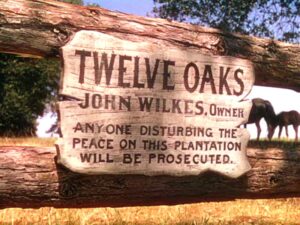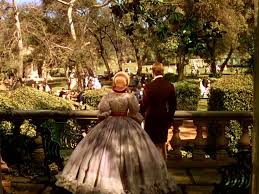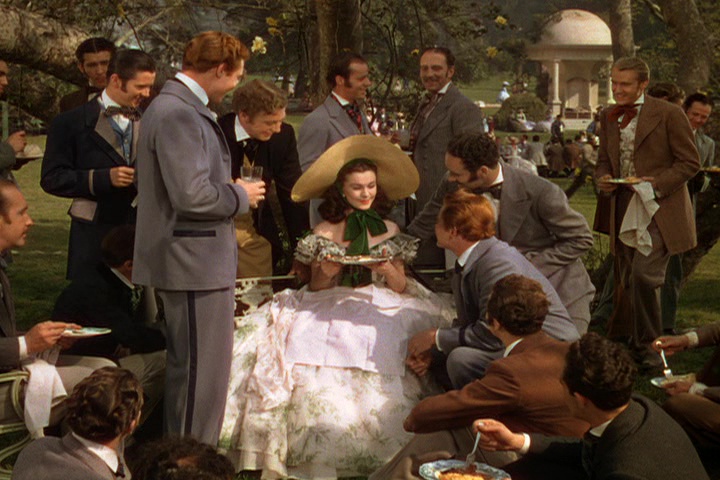Arriving at Twelve Oaks garden party, Gerald O’Hara is pleased to say, “Well, John Wilkes, it’s a grand day you’ll be havin’ for the barbecue.” It’s momentous because it is the beginning of Scarlett and Rhett Butler’s relationship and the engagement party for Ashley Wilkes and Melanie Hamilton. As a social gathering, it is also a metaphor for Southern arrogance and folly. The Civil War is beginning, and the Confederacy will lose. 
Importantly, the film departs Mitchell’s Gone With the Wind by omitting the enslaved people’s barbecue at Twelve Oakes. Mitchell, whose handling of slavery is slippery and pro-South, writes that though unseen, the enslaved people (she calls them servants) were united with the Wilkes and company by the pervasive aroma of barbecue. But David O. Selznick, the film’s producer, and guiding force ignores this detail.
The screenplay describes the party as a barbeque,” a scene of gaiety and wild charm. The barbecue – a furbelow (showy?) feast – is spread over the lawn. Children run under the trees. Black Mammies tag after them. Gallants and their ladies are eating, drinking, laughing – and Negroes, grinning and shiny-eyed, wander over the grass, holding aloft great trays of food and drink. There is a long table stretching down the center of the lawn where many guests sit.” 
But this is not what we see. Instead of a table, Scarlett sits like a queen, plate in hand, surrounded by a dozen admirers. “Now isn’t this better than sitting at an old table? A girl hasn’t only two sides to her at a table,” she declares.
Insulated from the “gaiety and wild charm,” we see Ashley Wilkes and Melanie Hamilton smiling (without passion) at each other. Beyond them is an endless vista of guests strolling in a manicured garden.
The cast: Vivienne Leigh as Scarlett O’Hara; Clark Gable as Rhett Butler; Olivia de Haviland as Melanie Hamilton; Leslie Howard as Ashley Wilkes
See Margaret Mitchell. Gone With the Wind. New York: Macmillan Company, 1936; Victor Fleming. Gone With the Wind (1939). The screenplay is by Sidney Howard and is based on Margaret Mitchell’s novel (1936).
*David O. Selznick was a tough producer. He fired George Cukor and Sam Wood before settling on Victor Fleming. Besides Sidney Howard, writers included Oliver H.P. Garrett, Ben Hecht, Jo Swerling, and John Van Druten.

